She began her career as a lyric soprano and concluded it as a dramatic soprano. She has portrayed Norma, Tosca, Madame Butterfly and around seventy other heroines that she’s brought to life for audiences at her home theatre of the National Theatre in Belgrade, Milan’s La Scala, New York’s Metropolitan, the Vienna State Opera and more than 200 other stages worldwide. In the history of opera, she holds the record for largest number of performances of Norma. Her operatic partners have included Franco Corelli, Plácido Domingo, José Carreras, and prior to all of them Mario Del Monaco, who dubbed her the new Maria Callas!
Of all the roles she’s played, she loved Tatyana from Eugene Onegin the most, and has even performed the role in four languages: Russian, German, Italian and Serbian. She also sang it at St. Petersburg’s Mariinsky Theatre, receiving critical acclaim with the statement that “such a Tatyana has never previously passed through Mariinsky Theatre”. Famous Russian opera diva and Bolshoi Theatre soloist Galina Vishnevskaya told her: “You know, Radmila, I never received such a critique!”
Francesco Siciliani, who spent 20 years as artistic director of Milan’s La Scala and is credited with having done the most to further the fame and repute of the likes of Maria Callas, Mario Del Monaco and Renata Tebaldi, once told Radmila, but also stated of her publicly in an interview, that she “most wisely managed her career”.
She could have gone abroad, with major opera houses having invited her to join them, but she only ever made guest appearances overseas and never considered remaining resident somewhere else:
“Wherever I went, I could hardly wait to return home. I couldn’t live without my Belgrade, without my neighbourhood that I’d departed from to go out into the world, and to which I always returned.”
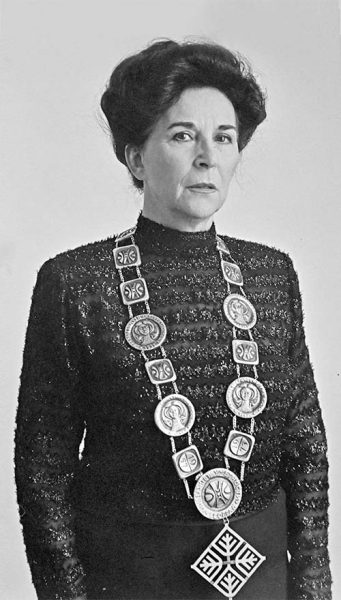
Radmila turns 90 this January, and her appearance, demeanour and level of interest in everything occurring in the world of opera, and in her students, ensure that she remains greatly respected. This CorD Magazine interview also provides an opportunity for us to record some of the more important and interesting moments from her rich life.
Radmila’s father, Đorđe, who completed his secondary school studies at the agricultural high school and specialised in vine grafting, managed a nursery in Guča, the small Serbian town that would become famous 30 years after Radmila’s birth, with the establishing of the trumpet festival that is still held remains famous to this day. As the head of the family, he ensured that the members of the household didn’t lack basic things, while her mother, Darinka, cut short her studies at home economics school due to love, wed, and birthed and raised three children. The children were raised from an early age to work in and around the house.
When winter would come and all three of them would gather around their mother, she would sing to them with her divine voice, and Radmila’s older brother, Srećko, would also sing and had an exceptional voice, while Radmila would just open her mouth. She had her first concert in Guča, under the organisation of the Circle of Serbian Sisters, singing to the accompaniment of an accordion. She would also sing for Saint Sava shows at school.
Her father, who originally hailed from the village of Dučalovići in the foothills of Ovčar mountain, was a diligent and wise man whose words of advice have remained with her throughout her life.
“He would tell us never to ignore another person because of the work they do, because by doing so we will only degrade ourselves.” Then, ‘it is far easier to vanquish than to apologise’. And one more that’s worth remembering and sticking to: ‘before uttering a sentence, imagine that you have water in your mouth, so wait to swallow it and only then speak’. We spent the summers with our grandparents on the mountain, while we also had our own plot of land near Čačak, which we would work, and we also had a cow, so I dealt with all the work in the house and on the farm from early childhood. I only had my first proper summer holiday, and saw the sea for the first time, when I married Aleksandar and we went on holiday together.
Wherever I went, I could hardly wait to return home. I couldn’t live without my Belgrade, without my neighbourhood that I’d departed from to go out into the world, and to which I always returned
“I was eight or nine when I learnt to cook. My mother or maternal grandmother would start, explaining to me what to do next, and I would cook and take lunch to them in the fields where they were working. My mother had learnt to sew in home economics school and she sewed for us, and I also learnt to sew as a youngster. I was capable of sewing a costume for myself. Today I still have a sewing machine at home. My younger brother once said that we were ‘privileged children, because we had wonderful parents’. That is the greatest truth and the greatest fortune that we had.”
Among the many photos on the walls of Radmila’s apartment showing her playing various roles, one wall is also adorned with a large tapestry that represents an excellent artwork that she created herself.
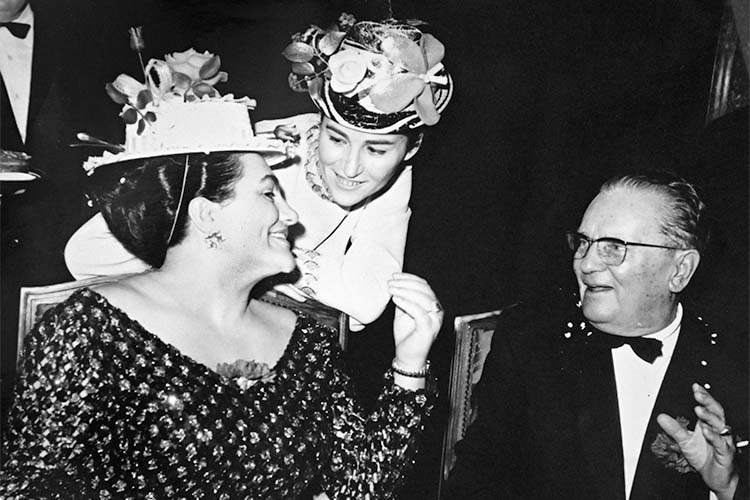
“I mostly created that tapestry abroad, while doing guest appearances, working on it during breaks between performances. I also learnt to knit and crochet, while I even spun wool… My upbringing required that a woman know everything that needs to be done in the home. And even today, in these later years, I still do everything around the house, except that a woman comes once a week to wash the windows and doors, and to vacuum. I’m no longer able to do those rough jobs, but I’m accustomed to spending my whole life not being idle.”
Her father’s idea was for his daughter to complete teacher training college, as he was convinced that this was enough education for a girl. He also thought that she should immediately find employment and assist her brothers. Her elder brother graduated from the forestry faculty, while the younger one graduated in electrical engineering and worked as director of the power plant in Čačak.
I only had my first proper summer holiday, and saw the sea for the first time, when I married Aleksandar and we went on holiday together
“I got along wonderfully with my brothers. Unfortunately, during the time of the COVID pandemic, I lost them both in a short period of time. Dad struggled to come to terms with the fact that I’d chosen a different career than the one he’d intended for me, he was constantly afraid about that. He used to say: ‘When are you going to stop spinning in the sky? I’m always worried’. He didn’t like that I was flying by plane so much.”
Radmila Vasović (her maiden name) completed teacher training college in Užice. During the time of her schooling, in 1949, Belgrade hosted a major competition of cultural and artistic societies from across Yugoslavia. Radmila sang as a solo, in a duet and in an octet comprising teachers and pupils. And she won! She was then in her third year of studies, and one Professor Vasiljević, who already knew about her, offered her the chance to move to Belgrade to finish teacher training college and simultaneously become literate in music. That wasn’t possible, as she had a scholarship as a good student, and upon completing her studies she was supposed to move to Tutin to work as a teacher, because a large percentage of the Sandžak population was illiterate. That was a time when the state would decree where the people would work. And yet, given that she was already known as a rare singing talent, the prevailing attitude was that anyone who graduated in teacher training could become a good young teacher, while a talent like Radmila should receive additional schooling.
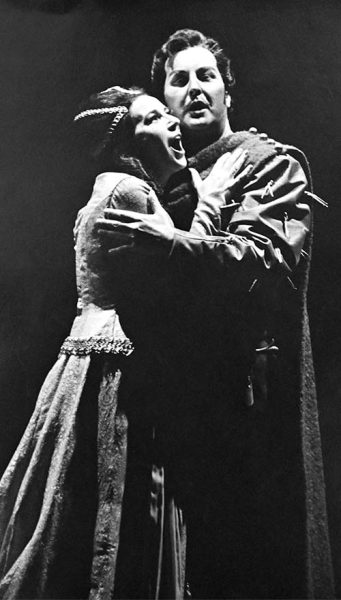
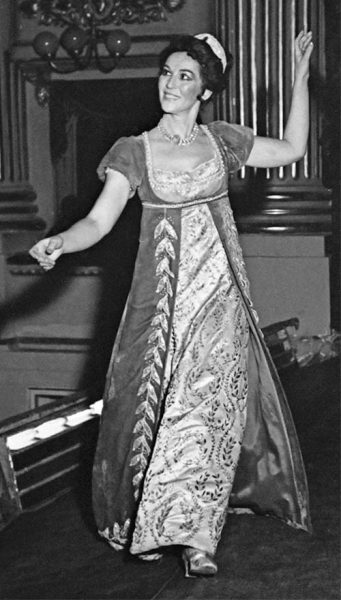
“Those who decided on my future nevertheless assessed that, instead of Tutin, it would be better for me to go to Belgrade and enrol in secondary music school, as I knew nothing other than how to sing, and only folk songs. Over the next four years, I completed both secondary music school and the Music Academy. And I almost abandoned my studies. I arrived for the enrolment exam, and while climbing the stairs I heard other candidates singing opera arias, and I had absolutely no idea how to do that. I’d heard about opera music in secondary school, but I didn’t know the notes and I didn’t know a single aria. I was heading for the exit when I bumped into a friend from Užice, who nagged me to go back and sing what I knew, and who advised me that when they ask me who I want to learn singing under I should say Nikola Cvejić. And that’s how it was. When I sang what I knew, a member of the committee told the pianist to give me octaves. And they immediately realised how far I was capable of going. They told me immediately that I was accepted and asked me which professor I wanted to be placed with. I of course gave the name of Nikola Cvejić (1896-1987), and that was the pedagogue who helped me the most and meant the most in my career. He and his wife Marija were my second parents. And in my later learning the most precious help to me was provided by pianist Zdenko Marasović (1925-1987).
The Belgrade period of her schooling began in 1951. She sang Mozart’s Requiem with the Academy in 1953, then entered the National Theatre in 1955. It was three years later that Radmila married Aleksandar Bakočević (1928- 2007), the then secretary of the Society for Culture and Education, and in 1959 she gave birth to a daughter, Margareta. She continued singing her roles until the seventh month of pregnancy. Margareta proved to be an excellent pupil. She’d wanted to study acting for a short time, but that was a phase that passed quickly. She graduated, then continued her studies and earned a doctorate in Spanish while she was in Switzerland, where she lived there with her husband, opera singer Slobodan Bane Stanković, with whom she has a daughter, Ksenija, who is also completing language studies. As Radmila’s husband forged his political career and spent many years serving successfully as the mayor of Belgrade, rumours could be heard suggesting he had also been responsible for her successes and accolades.
I learnt to make tapestries, to sew, knit and crochet. My upbringing required that a woman know everything that needs to be done in the home. And even today, in these later years, I still do everything around the house, except the rougher jobs
“He deserves the greatest credit for being always by my side. It sometimes happened that I wanted to withdraw from some contract, to take a little break and spend more time at home with the two of them. However, he always encouraged me to continue. He would say how I’d exerted a lot of effort, that I’d tormented myself a lot, and that was why I mustn’t quit. Perhaps I’d one day regret having missed out on something, and perhaps I’d blame him for having not supported me. I was lucky that my mother was always there to take care of Margareta. My dad once said: ‘I didn’t know that I married both a daughter and a wife! He’d wanted to say that mum was out of the house because of her granddaughter, but he didn’t get angry.”
Radmila and Aleksandar’s daughter was named after the character of Marguerite from the opera Faust, who Radmila portrayed. Her father had given her the name when he went to the municipality to register her birth. The young father had had another meaning for that name in mind. That’s because one of the most beautiful common flowers is known in French as ‘marguerite, and in Serbian as ‘white [white] Rada’, and in English as the common daisy.
She called her husband by the nickname Ale. She loved him dearly and appreciated his exceptional conduct and education.
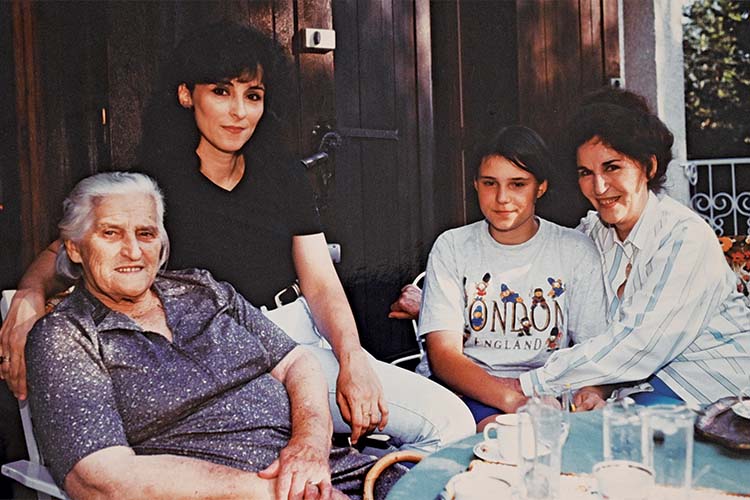
“We were married for almost 50 years, until he departed, and we never fought. And when he was in the wrong, I would remain silent, and wait for some better opportunity to tell him that he was wrong. I’ve actually never had an argument with a single person. I’ve endured various lies, insults… One of my female colleagues claimed, speaking in front of 10,000 people during one of the Belgrade protests of the ‘90s, that my husband had arranged contracts for me over the phone! I didn’t react. After so many years, she contacted me around ten days ago to tell me that she’d been hugely mistaken about me. What was I supposed to say? To explain to anyone what this job that I dedicated my life to is like, how much time I invested in every premiere, every show, every guest appearance. That story about my husband being a politician and supposedly helping me was so nonsensical that I never wanted to comment on it. I remember on one occasion, in San Francisco, that a critic there wrote that he’d attended my show ‘The Troubadour’ just to see for himself how I’d got there, because it is known that my husband is a prominent Yugoslav politician. And he concluded the article by writing that he’d stayed until the end of the show solely because of me. That was the only time that any critic even mentioned my husband in the context of my work.
“And when it comes to the awards that I received, you should know that I began my career as Radmila Vasović and received my first awards as a young artist with that surname. At the end of the day, do you think it’s possible to influence people in a world ruled by such strict criteria?”
She was a recipient of all the most important awards in Yugoslavia: the October award, the 7th July award, the AVNOJ award, Vuk’s award… In the 1976-77 season. her Norma was proclaimed Italy’s best opera production. She also received awards in Spain, Japan and other countries.
My husband Aleksandar was always by my side, encouraging me to continue. He would say how I’d exerted a lot of effort, that I’d tormented myself a lot, and that was why I mustn’t quit. We were married for almost 50 years, until he departed, and we never fought
The first world opera great with whom she sang was Mario Del Monaco (1915-1982), who made his first guest appearance in Belgrade, in the opera Carmen, back in 1960. Radmila sang the role of Micaëla just a month after giving birth. Later, at the invitation of the Ministry of Culture, the Belgrade Opera was visited by the management of Milan’s La Scala, who awarded Radmila a one-year scholarship.
“I also sang with other greats and had only one goal – to give my all. Several of those foreign colleagues told me that I’d brought tranquillity to the piece. And it was important for me that we understood each other well, that we performed to the best of our ability. Friendships were born of that shared desire. I became friends with most of my colleagues and was accepted in their homes, by their wives. It’s generally the case in that world that if the husband is a singer, the wife goes with him. And vice versa. Together with Franco Corelli (1921-2003), who was the biggest opera star during those years, I sang Norma at La Scala, and that just happened to be for one New Year celebration. My husband came from Belgrade and we welcomed the New Year together, at Corelli’s house.”
When on one occasion she sang Norma in Lisbon, the audience had included the sister of a famous manager called Bingo, who told her brother that she was listening to a singer whom she thought belonged at the Metropolitan. Bingo authorised his agent in Europe to listen to Radmila sing, and that’s how she received an engagement at the world ‘temple of opera’.
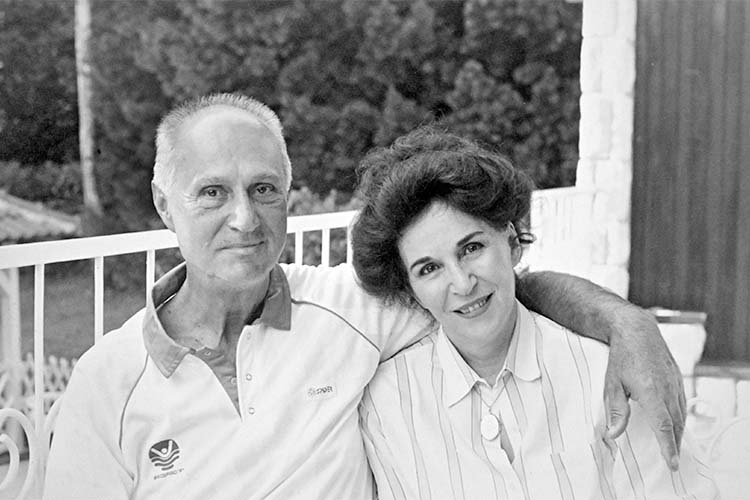
It was while she was in America that she met famous Spanish tenor Placido Domingo (1941) for the first time. His wife, Marta, was also an opera singer, but she retired after becoming a mother because she didn’t want ‘other people to raise her children’. Radmila remained on friendly terms with him, and she would often say that he was her favourite partner. When he performed a concert in Belgrade in 2014, this ‘king of the opera’, as he’s dubbed for having performed more than 140 singing roles in his career, he’d looked around the crowded Arena and called out: “Rada, where are you?” And Radmila stood up and declared ‘here I am’, greeting him but remaining in her place. The audience applauded for her to go on stage, but she stayed in her place. She made her last appearance on the opera stage in 2004. She served as a professor at the Faculty of Music Arts in Belgrade, then became rector of the University of Arts. Together with Dr Branko Radović, the then dean of the Faculty of Philology and Arts in Kragujevac, she formed the Department of Musical Arts and the Department of Solo Singing, where she taught and was selected as an emeritus professor. She speaks about her students with pride, to whom she says she was ‘both a parent and a teacher’. She is also grateful to her collaborator at the Academy, pianist Mirjana Tumpej.
At a time when Yugoslav President Josip Broz Tito showed great respect and appreciation in receiving top artists from various fields, Radmila was a welcome guest at receptions hosted by his and his wife Jovanka.
Tito would introduce me to his guests and would always say: ‘My comrade Radmila has never disappointed me, neither as an artist nor as a person!’ He liked to occasionally sit at the piano, to accompany me as I sang
“They both showed great interest in cultural events in our country and around the world. Jovanka prepared very carefully for every foreign visit and wanted to learn as much as possible about the history, tradition and culture of the country she would be visiting. Tito would introduce me to his guests at every reception and would always say: ‘My comrade Radmila has never disappointed me, neither as an artist nor as a person!’ He liked to occasionally sit at the piano, to accompany me as I sang. When I saw him at a reception for the first time after I’d given birth, he said to me: ‘Congratulations, I hope your son won’t be called Faust!’ I was proud that we had such a president.”
The Bakočević family received a gift from President Tito for New Year every year, in the form of a basket of drinks and a basket of tangerines.
Nonetheless, this great artist’s most beautiful and precious memories are linked to the opera scene. She spent a full 14 years singing as a guest performer at the Vienna State Opera. She spent a full 25 years making guest appearances at all Italian opera houses – from Milan’s La Scala to Bari in the south of Italy. She sang at Moscow’s Bolshoi Theatre for an entire month, while the temperature outside remained 37 below. She was healthy and didn’t even get the sniffles. She returned to Belgrade, spent one night at home and then travelled with the Belgrade Opera to make a guest performance in Cairo, where the temperature was 26 above.
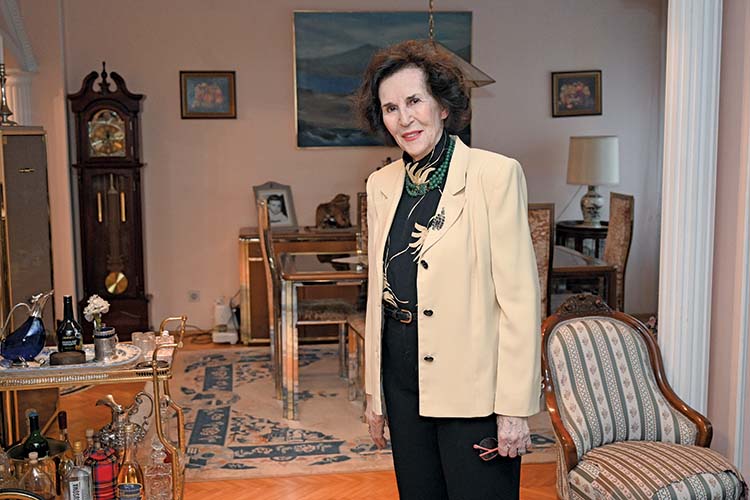
When talking about the Belgrade Opera, which was among Europe’s four largest opera houses during that ‘golden age’, she notes with great respect that the greatest credit for that belonged to famous Yugoslav conductor and composer Oskar Danon (1913-2009). Fond memories connect her to world-renowned baritone Željko Lučić, who made his debut for the Opera of the National Theatre while she was celebrating 40 years working on that stage. As she herself says, “Željko is a wonderful man, humble, and I’m very happy for his success”. She also has wonderful memories of one incarnation of Norma that she sang in Paris, when she received a call in Belgrade one morning to travel immediately to Paris and replace Montserrat Caballé, who she was scheduled to sing that evening, but had fallen sick. The singer’s costumes were too big for her, so they brought the costumes of Maria Callas from the museum and she sang in them.
She never liked to see the word diva written alongside her name. She liked to boast about how she sang in factory halls, accompanied by accordion master Dušan Radetić (1923-1967), first singing for the workers a folk song, then a Canzone Napoletana, and finally an opera aria. And they rewarded her with unceasing applause.
“I’m an artist who had a job that she loved. I was lucky that my career was successful, that I had a wonderful family from which I emerged, a wonderful husband, that I have a great daughter and granddaughter, that I was a self-realised and satisfied woman.”